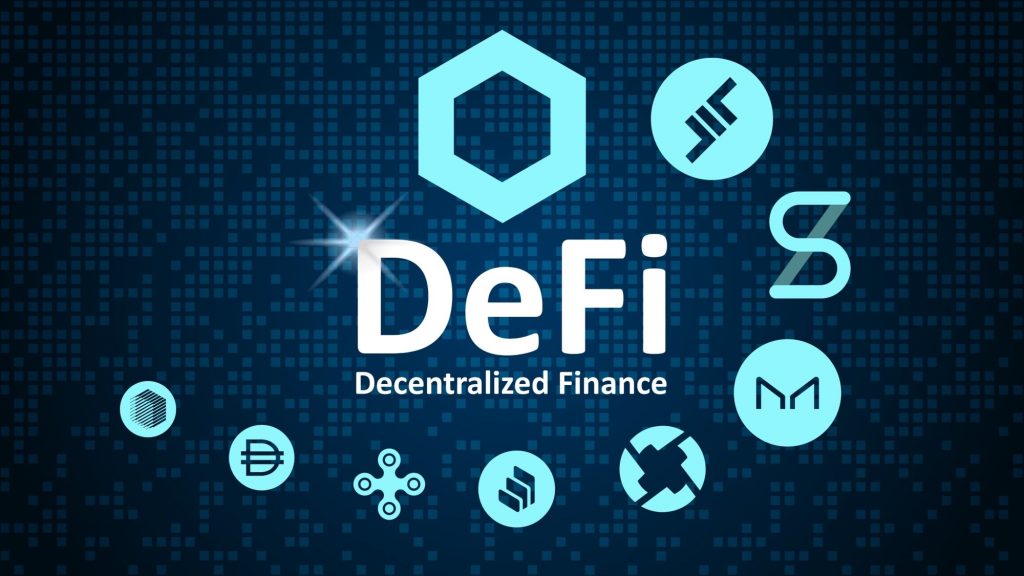Decentralized Finance (DeFi) Ecosystem
Defi crypto - Decentralized Finance (DeFi) refers to a rapidly evolving financial ecosystem that leverages blockchain technology to provide financial services without the need for intermediaries like banks or financial institutions. It empowers individuals to access and manage their finances in a more open, transparent, and accessible manner.
The DeFi ecosystem is characterized by its decentralized nature, meaning that it operates on a distributed network rather than being controlled by a central authority. This decentralization brings numerous benefits, including increased security, transparency, and resistance to censorship.
Key Components and Players
The DeFi ecosystem comprises various components and players, each contributing to its functionality and growth. These include:
- Blockchain networks: Ethereum, Binance Smart Chain, and Polygon are popular blockchain networks that host DeFi applications and facilitate transactions.
- Smart contracts: Self-executing contracts that automate the execution of financial agreements, ensuring transparency and reducing the need for intermediaries.
- Decentralized exchanges (DEXs): Peer-to-peer platforms that enable users to trade cryptocurrencies without the involvement of a central authority.
- Lending and borrowing platforms: Allow users to lend or borrow cryptocurrencies, earning interest or accessing liquidity.
- Stablecoins: Cryptocurrencies pegged to fiat currencies or other assets, providing price stability in the volatile crypto market.
Popular DeFi Protocols
The DeFi ecosystem boasts a wide range of protocols, each offering unique functionalities. Some notable examples include:
- Uniswap: A DEX that enables users to swap cryptocurrencies directly with each other, eliminating the need for a central order book.
- Aave: A lending and borrowing platform that allows users to earn interest on their crypto assets or borrow against them.
- MakerDAO: A decentralized stablecoin platform that issues the DAI stablecoin, which is backed by a collateral of crypto assets.
- Compound: A lending and borrowing platform that offers competitive interest rates and allows users to earn interest on their crypto assets.
DeFi Applications and Use Cases
DeFi applications are transforming the financial industry by offering a wide range of innovative services and use cases. From lending and borrowing to trading and insurance, DeFi is disrupting traditional financial services and empowering users with greater control over their finances.
Notice crypto coins for recommendations and other broad suggestions.
Here are some of the key applications and use cases of DeFi:
Lending and Borrowing
- DeFi lending platforms allow users to borrow and lend cryptocurrencies without the need for intermediaries such as banks.
- These platforms offer flexible interest rates and loan terms, making them more accessible and cost-effective than traditional lending options.
Trading
- DeFi exchanges allow users to trade cryptocurrencies directly with each other, eliminating the need for centralized exchanges.
- This provides users with greater control over their trades and reduces the risk of fraud and manipulation.
Insurance
- DeFi insurance protocols offer coverage against risks such as smart contract failures and hacks.
- These protocols provide users with peace of mind and protection against potential financial losses.
Real-World Examples
- Aave: A decentralized lending platform that allows users to borrow and lend cryptocurrencies.
- Uniswap: A decentralized exchange that allows users to trade cryptocurrencies directly with each other.
- Nexus Mutual: A decentralized insurance protocol that provides coverage against smart contract failures and hacks.
Benefits and Challenges of DeFi

Decentralized Finance (DeFi) offers numerous advantages over traditional financial systems, but it also presents certain risks and challenges.
Benefits of DeFi:
You also can investigate more thoroughly about blockchain wallet to enhance your awareness in the field of blockchain wallet.
- Transparency and Security: DeFi protocols are open-source, allowing users to verify transactions and code independently, reducing the risk of fraud and corruption.
- Accessibility and Inclusivity: DeFi eliminates intermediaries, making financial services available to anyone with an internet connection, regardless of their location or financial status.
- Innovation and Experimentation: DeFi enables the development and testing of new financial products and services without the constraints of traditional financial institutions.
Challenges of DeFi:
Obtain direct knowledge about the efficiency of youhodler through case studies.
- Regulatory Uncertainty: The regulatory landscape for DeFi is still evolving, creating uncertainty for users and developers.
- Smart Contract Risks: DeFi applications rely on smart contracts, which can contain vulnerabilities that could lead to financial losses.
- Market Volatility: DeFi markets can be highly volatile, exposing users to significant price fluctuations and potential losses.
Comparison with Traditional Financial Systems:
| Feature | DeFi | Traditional Financial Systems |
|---|---|---|
| Intermediaries | Eliminated | Required (banks, brokers) |
| Transparency | Open-source, verifiable | Limited transparency, closed systems |
| Accessibility | Open to all | Restricted by geography, regulations |
| Innovation | Rapid and experimental | Slow and conservative |
DeFi Security and Regulation: Defi Crypto

The decentralized nature of DeFi introduces unique security challenges and regulatory implications. Understanding these aspects is crucial for the growth and adoption of DeFi.
DeFi protocols implement various security measures to safeguard user funds and protect against malicious activities. These measures include:
- Smart contract audits: Third-party audits review and verify the security of smart contracts to identify and address vulnerabilities.
- Decentralized autonomous organizations (DAOs): DAOs allow communities to collectively govern and make decisions, promoting transparency and accountability.
- Insurance protocols: DeFi insurance providers offer coverage against potential losses due to smart contract exploits or hacks.
Regulatory Landscape
The regulatory landscape surrounding DeFi is evolving rapidly. Governments and regulatory bodies worldwide are exploring frameworks to oversee DeFi activities while fostering innovation.
The regulatory approach varies across jurisdictions. Some countries have adopted a cautious stance, while others are taking a more proactive approach to facilitate DeFi development.
Challenges and opportunities coexist in DeFi regulation:
- Challenges: Striking a balance between protecting investors and stifling innovation, defining clear regulatory boundaries, and addressing cross-border regulatory issues.
- Opportunities: Providing legal clarity, fostering trust and confidence in DeFi, and promoting responsible growth.
Future of DeFi
 The future of DeFi holds immense potential for growth and evolution. As the industry matures, we can expect to see a number of emerging trends and innovations that will shape its future.
The future of DeFi holds immense potential for growth and evolution. As the industry matures, we can expect to see a number of emerging trends and innovations that will shape its future. Factors Shaping the Future of DeFi
Several key factors will influence the future of DeFi, including:- Regulatory clarity: As governments and regulators around the world develop frameworks for DeFi, it will provide greater certainty and stability for the industry.
- Technological advancements: Ongoing advancements in blockchain technology, such as Layer 2 solutions and cross-chain interoperability, will enhance the scalability, efficiency, and security of DeFi protocols.
- Institutional adoption: The increasing involvement of institutional investors and traditional financial institutions in DeFi will bring new capital and expertise to the space.
Emerging Trends and Innovations, Defi crypto
Some of the emerging trends and innovations that we can expect to see in the future of DeFi include:- Decentralized autonomous organizations (DAOs): DAOs are becoming increasingly popular as a way to govern DeFi protocols and communities, allowing for more transparent and democratic decision-making.
- Non-fungible tokens (NFTs): NFTs are being used to represent ownership of unique digital assets, such as art, collectibles, and even real-world assets, and they have the potential to play a significant role in DeFi.
- Yield farming and liquidity mining: These innovative mechanisms incentivize users to provide liquidity to DeFi protocols, thereby enhancing their efficiency and stability.
